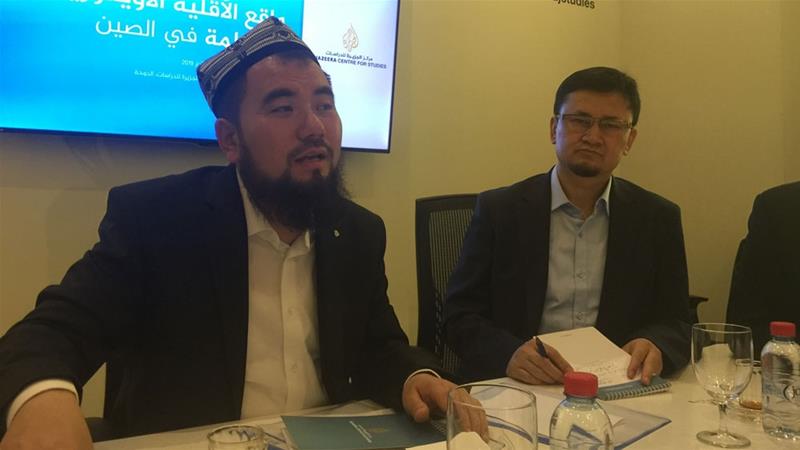By Ali Younes
 Mohamad Mahmoud, left, and Abdel Khaleq Uighur, right
Mohamad Mahmoud, left, and Abdel Khaleq Uighur, right Doha, Qatar -- A group of visiting Uighur Muslim scholars originally from China's East Turkestan colony has urged Muslim-majority countries to press China to end its "cultural war" against their ethnic compatriots.
According to a United Nations panel, more than one million Uighurs and other Muslims are held in mass detention centres in the remote western region.
During a visit to Qatar's capital, Doha, leaders from the Turkey-based Society of the Muslim Scholars of East Turkistan (SMSET) accused Beijing of engaging in systematic human rights violations of Uighurs in a bid to erase their cultural and religious heritage.
"The Chinese government is waging a cultural war against our people by trying to force us to abandon our Muslim faith and our heritage to become atheists and communists like the majority Chinese society," the SMSET's Abdel Khaleq Uighur said on Tuesday.
In January, China passed a new law that sought to "Sinicise" Islam within the next five years, the latest move by Beijing to rewrite how the religion is practised.
Sinification is a process of melting non-Chinese communities into the majority Han Chinese culture.
No Muslim country dared to condemn China for the mass incarceration of Uighurs and other ethnic Muslim minorities except Turkey, which has called on China to shut the camps.
No Muslim country dared to condemn China for the mass incarceration of Uighurs and other ethnic Muslim minorities except Turkey, which has called on China to shut the camps.
Ancient Silk Road
The Uighurs, whose homeland is in the heart of the ancient Silk Road, say Beijing sees their presence as an obstacle to its economic development and westward expansion through its flagship Belt and Road Initiative (BRI).
Launched in 2013, the massive investment drive aims to finance and build infrastructure in some 80 countries around the world, including in the Middle East and parts of Eurasia.
"With high-speed rail and other upgraded land transport developments, China strives to promote land and maritime trade simultaneously between China and the Middle East," Wang Jian, a professor of history and international political economy at Shanghai Academy of Social Sciences, said in a paper published in 2017.
Mohamad Mahmoud, of the SMET, argued that China's promises of vast wealth and economic development from its BRI projects have prevented Muslim-majority countries from addressing the crackdown on Uighurs.
"I hope that Muslim countries can overcome their fears of China and address its gross human rights abuses against our community," he said.
Uighurs speak a Turkic language distinct from the country's overwhelming Han majority.
According to a 2018 Amnesty report, open or even private displays of religious and cultural affiliation, including growing a beard, wearing a veil or headscarf, regular prayer, fasting or avoidance of alcohol, or possessing books or articles about Islam or Uighur culture can be considered "extremist" under the regulation.
Last week, the Chinese government published a lengthy policy paper outlining and defending its policy against the Uighurs as "deradicalisation" measures.
The paper admitted the arrest of 13,000 Muslim Uighurs since 2014.
Responding to government claims of "terrorism and radicalism" in the region, Mahmoud said the Chinese government claims are not true.
"Our people are not seeking separation and there is no terrorism or armed insurgency in East Turkistan," he said.
"The only terrorism in the region comes from the Chinese government itself," added Mahmoud.
Responding to government claims of "terrorism and radicalism" in the region, Mahmoud said the Chinese government claims are not true.
"Our people are not seeking separation and there is no terrorism or armed insurgency in East Turkistan," he said.
"The only terrorism in the region comes from the Chinese government itself," added Mahmoud.

